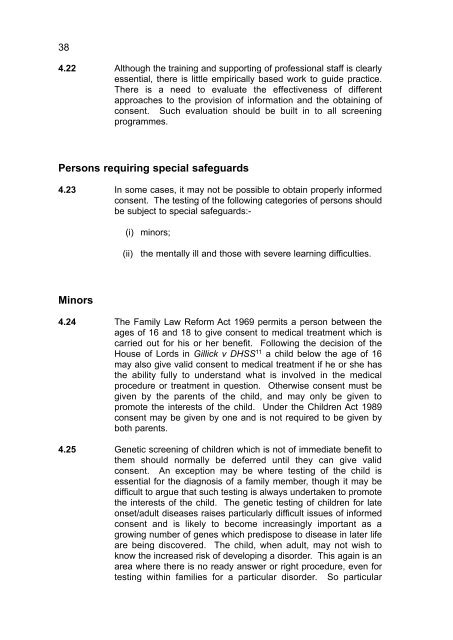Genetic screening: ethical issues - Nuffield Council on Bioethics
Genetic screening: ethical issues - Nuffield Council on Bioethics
Genetic screening: ethical issues - Nuffield Council on Bioethics
Create successful ePaper yourself
Turn your PDF publications into a flip-book with our unique Google optimized e-Paper software.
38<br />
4.22 Although the training and supporting of professi<strong>on</strong>al staff is clearly<br />
essential, there is little empirically based work to guide practice.<br />
There is a need to evaluate the effectiveness of different<br />
approaches to the provisi<strong>on</strong> of informati<strong>on</strong> and the obtaining of<br />
c<strong>on</strong>sent. Such evaluati<strong>on</strong> should be built in to all <str<strong>on</strong>g>screening</str<strong>on</strong>g><br />
programmes.<br />
Pers<strong>on</strong>s requiring special safeguards<br />
4.23 In some cases, it may not be possible to obtain properly informed<br />
c<strong>on</strong>sent. The testing of the following categories of pers<strong>on</strong>s should<br />
be subject to special safeguards:-<br />
(i)<br />
(ii)<br />
minors;<br />
the mentally ill and those with severe learning difficulties.<br />
Minors<br />
4.24 The Family Law Reform Act 1969 permits a pers<strong>on</strong> between the<br />
ages of 16 and 18 to give c<strong>on</strong>sent to medical treatment which is<br />
carried out for his or her benefit. Following the decisi<strong>on</strong> of the<br />
House of Lords in Gillick v DHSS 11 a child below the age of 16<br />
may also give valid c<strong>on</strong>sent to medical treatment if he or she has<br />
the ability fully to understand what is involved in the medical<br />
procedure or treatment in questi<strong>on</strong>. Otherwise c<strong>on</strong>sent must be<br />
given by the parents of the child, and may <strong>on</strong>ly be given to<br />
promote the interests of the child. Under the Children Act 1989<br />
c<strong>on</strong>sent may be given by <strong>on</strong>e and is not required to be given by<br />
both parents.<br />
4.25 <str<strong>on</strong>g>Genetic</str<strong>on</strong>g> <str<strong>on</strong>g>screening</str<strong>on</strong>g> of children which is not of immediate benefit to<br />
them should normally be deferred until they can give valid<br />
c<strong>on</strong>sent. An excepti<strong>on</strong> may be where testing of the child is<br />
essential for the diagnosis of a family member, though it may be<br />
difficult to argue that such testing is always undertaken to promote<br />
the interests of the child. The genetic testing of children for late<br />
<strong>on</strong>set/adult diseases raises particularly difficult <str<strong>on</strong>g>issues</str<strong>on</strong>g> of informed<br />
c<strong>on</strong>sent and is likely to become increasingly important as a<br />
growing number of genes which predispose to disease in later life<br />
are being discovered. The child, when adult, may not wish to<br />
know the increased risk of developing a disorder. This again is an<br />
area where there is no ready answer or right procedure, even for<br />
testing within families for a particular disorder. So particular
















